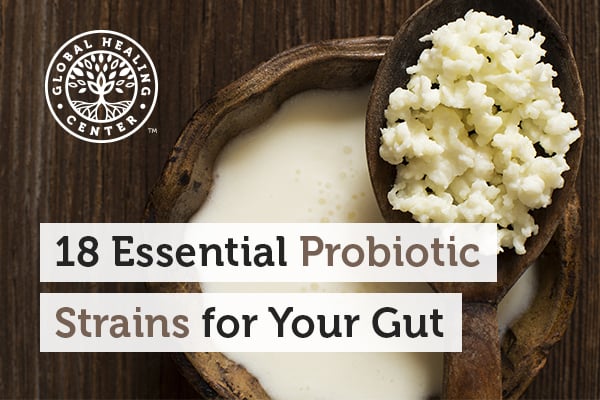
The bacteria in your gut have a huge impact on your health and well-being. They affect how well you digest food, absorb nutrients, the strength of your immune system, and the health of your small intestine and colon, and that barely scratches the surface. The importance of probiotics for supporting gut health cannot be overstated. The bacteria in your gut are a community and there are many types, or strains, of bacteria that make up that community. Here we'll take a look at the eighteen best probiotic strains for supporting gut health.
Best Probiotic Strains for Your Gut
1. Streptococcus thermophilus
Streptococcus thermophilus promotes healthy tissue in the small intestine.[1] It discourages nitrates, like those in spinach and celery from turning into harmful nitrites.
2. Bacillus laterosporus
Bacillus laterosporus is a hearty strain that fights many types of harmful organisms, including candida.
3. Pediococcus acidilactici
Undigested food can rot in your gut; Pediococcus acidilactici helps put a stop to it. It also helps keep harmful organisms from damaging the gut environment.[2]
4. Bifidobacterium breve
Bifidobacterium breve is essential for colon health, especially if you’ve taken antibiotics. Many digestive concerns coincide with low levels of B. breve.
5. Bifidobacterium infantis
Bifidobacterium infantis supports the digestive system by releasing an acid that keeps harmful organisms from taking hold. It’s especially helpful for people suffering from digestive ailments or occasional constipation.[3]
6. Bifidobacterium bifidum
Bifidobacterium bifidum is a household name in probiotic strains (if there is such a thing). It keeps unwanted bacteria out, eases digestion, and boosts the immune system. It plays an important role in immune function and allergy response; and encourages normal, healthy looking skin.[4]
7. Bifidobacterium lactis
Bifidobacterium lactis neutralizes gliadin, the wheat protein responsible for gluten sensitivity. Gliadin also damages the intestinal lining and can cause leaky gut.
8. Bifidobacterium longum
Bifidobacterium longum helps keep acid levels balanced. It’s especially helpful for anyone taking antibiotics.
9. Lactobacillus acidophilus
Lactobacillus acidophilus supports digestion, particularly lactose digestion, and boosts the immune system.
10. Lactobacillus brevis
Helping out on both ends, Lactobacillus brevis is soothing to both oral and colon tissue.[5]
11. Lactobacillus bulgaricus
Lactobacillus bulgaricus creates natural antibiotics in your gut that fight invading organisms. It also releases acids that neutralize toxins and promote balance.
12. Lactobacillus casei
Lactobacillus casei supports digestion, the immune system, and soothes the bowels.[6]
13. Lactobacillus gasseri
Lactobacillus gasseri supports digestion, balanced blood sugar, and encourages a normal body weight.[7]
14. Lactococcus lactis
Lactococcus lactis helps digestion and encourages a normal gut environment, especially helping to defend against leaky gut.
15. Lactobacillus plantarum
Lactobacillus plantarum produces L. lysine, an amino acid that supports calcium absorption, hormone production, and boosts the immune system. It’s often used as a remedy for bowel disorders.
16. Lactobacillus paracasei
Lactobacillus paracasei helps with fatigue, protects teeth from cavities, and many people also report it lessens the impact of environmental sensitivities.
17. Lactobacillus rhamnosus
Generally cited for promoting a happy and healthy gut environment, Lactobacillus rhamnosus also has a reputation for helping with UTIs by kick-starting antibodies and boosting the immune system.
18. Lactobacillus salivarius
Lactobacillus salivarius fights unwanted microbes in the mouth and the small intestine. It’s considered essential for oral health. This strain, as do many, thrives when provided with prebiotic foods like banana, barley, tomatoes, and garlic.

Why You Need Probiotics
Length: 2 minutes
What’s Your Favorite Probiotic?
There are many ways to add probiotics to your life, but relatively few that provide multiple strains. An advanced probiotic formula, such as Global Healing's Ultimate Probiotic combines many of the best probiotic strains into one source.
References (7)
- Whitford, E.J. et al. National Center for Biotechnology Information. Effects of Streptococcus thermophilus TH-4 on Intestinal Mucositis Induced by the Chemotherapeutic Agent, 5- Fluorouracil (5-FU). Cancer Biol Ther. 2009 Mar 15;8(6):505-11. Epub 2009 Mar 15.
- Kaur B, Garg N, Sachdev A, Kumar B. Effect of the oral intake of probiotic Pediococcus acidilactici BA28 on Helicobacter pylori causing peptic ulcer in C57BL/6 mice models. Appl Biochem Biotechnol. 2014 Jan;172(2):973-83.
- Efficacy of an Encapsulated Probiotic Bifidobacterium Infantis 35624 in Women with Irritable Bowel Syndrome. Am J Gastroenterol. 2006 Jul;101(7):1581-90.
- Martín R, Rijkers G, Sengers F, Timmerman H, van Uden N, Smidt H, Kimpen J, Hoekstra M. The effects of selected probiotic strains on the development of eczema (the PandA study). Allergy. 2009 Sep; 64(9):1349-58. Epub 2009 Apr 9.
- Tasli L, Mat C, De Simone C, Yazici H. Lactobacilli lozenges in the management of oral ulcers of Behcet's syndrome. Clin Exp Rheumatol. 2006 Sep-Oct;24(5 Suppl 42):S83-6.
- Llopis M1, Antolin M, Carol M, Borruel N, Casellas F, Martinez C, Espín-Basany E, Guarner F, Malagelada JR. Lactobacillus casei downregulates commensals' inflammatory signals in Crohn's disease mucosa. Inflamm Bowel Dis. 2009 Feb;15(2):275-83. doi: 10.1002/ibd.20736.
- Kang JH1, Yun SI, Park MH, Park JH, Jeong SY, Park HO. Anti-obesity effect of Lactobacillus gasseri BNR17 in high-sucrose diet-induced obese mice. PLoS One. 2013;8(1):e54617. doi: 10.1371/journal.pone.0054617. Epub 2013 Jan 30.
†Results may vary. Information and statements made are for education purposes and are not intended to replace the advice of your doctor. If you have a severe medical condition or health concern, see your physician.



